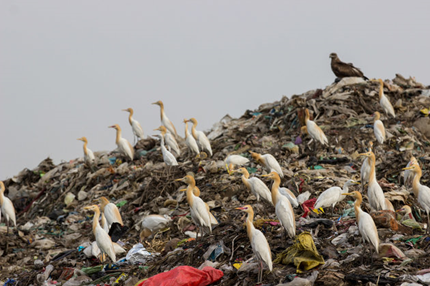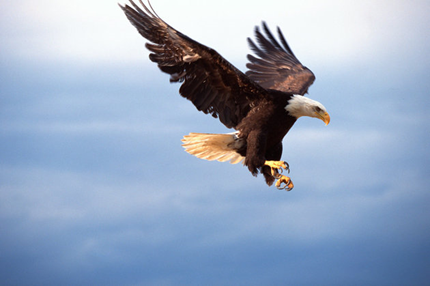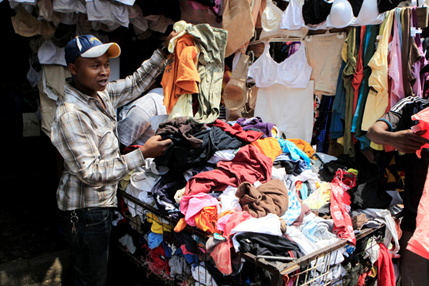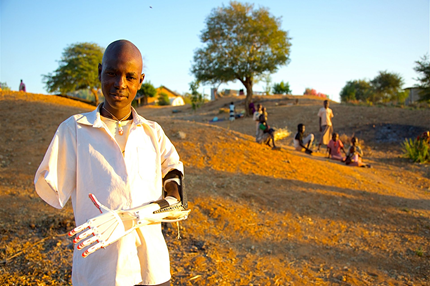Birds Are Becoming Totally Dependent On Our Delicious Landfills

Cattle egrets scout for food at a landfill in India. Partha Hazarika/Barcroft India via Getty Images
In some cases, it’s because we’ve destroyed their natural habitats.
Conservationists and those concerned about human hunger pretty much agree that the enormous amount of food wasted around the world is a huge problem — and that concerted efforts to reduce food waste are a good thing.
But while tackling the issue of food waste, it’s important to consider how doing so could have some unintended, negative consequences for the natural world, says Professor Iain Gordon, deputy vice chancellor of tropical environments and societies at Australia’s James Cook University.
Gordon, who has spent his career studying biodiversity and promoting sustainable land use, has researched how some animal species — particularly birds — have become dependent on human food waste. Reducing food waste without taking that into consideration, he says, could have devastating consequences for those species.
In many cases, Gordon says, the animals became dependent on food sources like landfills in the first place because humans destroyed their habitat or depleted their natural food sources.
“For species such as the white ibis in Australia the use of landfill sites correlates with the reduction in the wetland habitats that ibis naturally use and also prolonged droughts, which reduced the area of wetlands,” he told The Huffington Post in an email. “For other species such as gulls it may relate to our overharvesting of fish species that would have been the normal prey.”
In some cases, the abundance of human food waste has even altered the natural behavior patterns of birds. A March study led by a U.K. scientist found that white storks in Europe, which previously migrated to Africa for the winter, have started staying in Spain and Portugal year-round because they are “addicted” to the “junk food” they eat at landfills in those countries.
Women's rights and gender equality, we highlights issues affecting women, girls and transgender people.


Even the majestic bald eagle hasn’t been immune to the lures of landfills — which Gordon notes is an “easy food source” for the birds of prey.
“They appear to feed on red meat and bones and even prey on other birds and rats on the landfill sites,” he said. “Evidence suggests particularly young birds use landfills and there may be individual variation such that some birds become landfill specialists.”
Sight and sounds from Tomoka Landfill, home of hundreds of birds and dumping ground for 1,500 tons of garbage each day. Video by Ron Hurtibise
All that said, Gordon stressed that he was by no means suggesting that people keep wasting food. Reducing food waste sent to landfills is overall a good thing for biodiversity. Among other benefits, cutting down on excess food production reduces pressure on land to produce food and reduces pollution, he noted.

A bald eagle in flight. It’s unclear whether this bird is a “landfill specialist,” but some eagles use landfills as an easy way to get food. Jupiterimages via Getty Images
Instead, Gordon said, we should be researching which animals are largely dependent on our food waste, and then figure out ways to mitigate the potential negative impacts of food waste reduction on them.
“We should look at restoring the habitats and natural food supplies of those species which have become dependent on landfills,” he said. “For those species that use it as supplementation and that have alternative food sources, the main thing will be to reduce the food and they will move elsewhere.”


YOU MAY ALSO
LIKE:...
GREAT DEALS FOR
YOU:...

SUGGESTED FOR
YOU

SPONSORED CONTENT


YOUR SHOPPING MADE EASY
Africa's Change Makers Magazine
COMPANY
AFRICAN ACHIEVERS INTERNATIONAL Inc. is a global media and technology company including lifestyle media publisher SEMA AFRICA
online
Magazine AFRICAN ACHIEVERS MAGAZINE, digital shopping
platform PA-BEAUTY STATION.COM, event management
PRIDE OF AFRICA, awards program AfIA
AWARDS, youth and talent development, PILLARS OF
HOPE and AAK, Volunteerism
UNIVERSIDAY grassroots community support
NAD and financial support
REMITGROW and monthly subscription box AAi Must
Have. ....
More from African Achievers International
SUBSCRIBE















